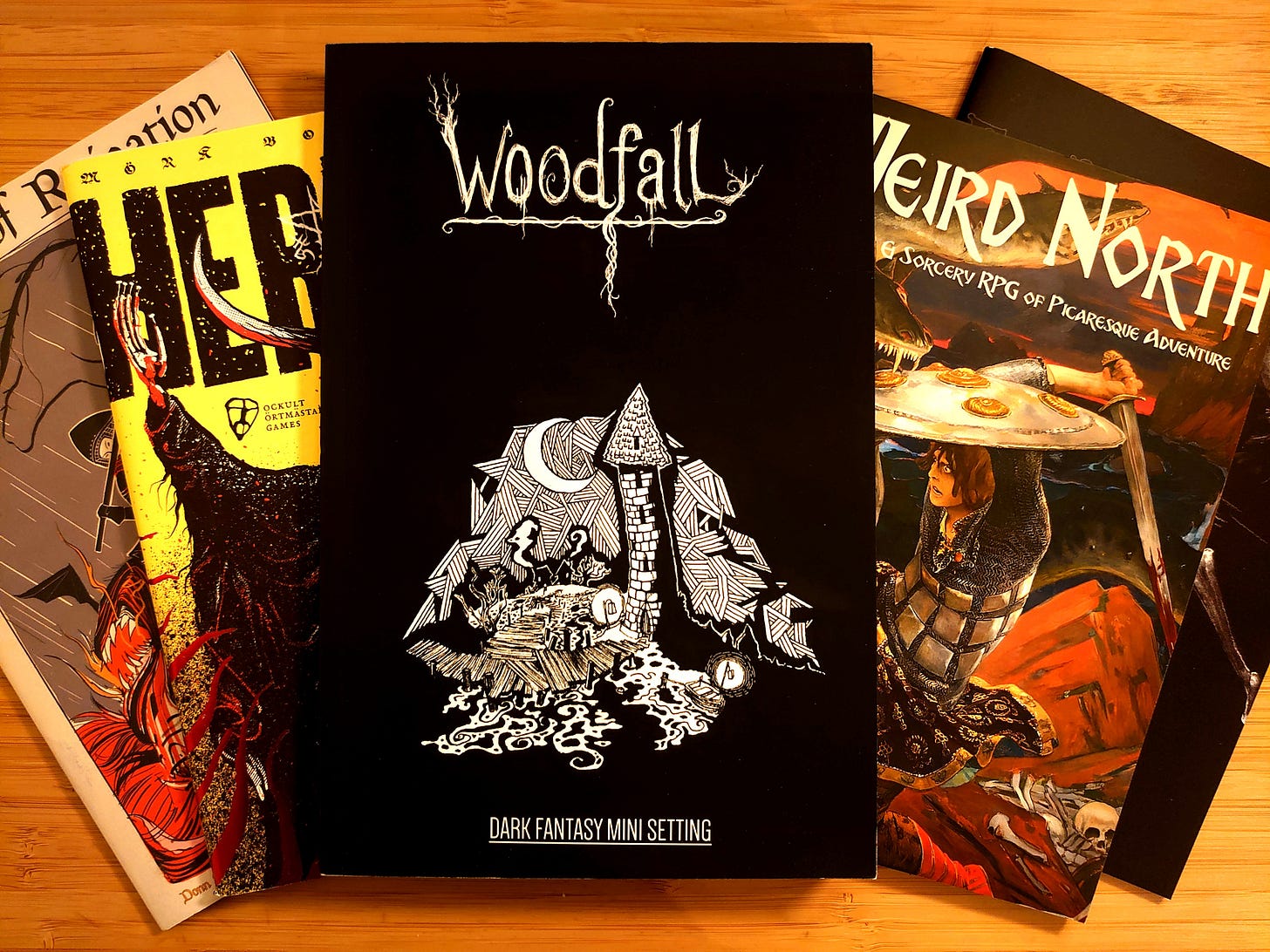Crisis in creation and rethinking ideas
Game Design Log #49
I reached a moment in my design of “No Peace of the Heathen” (NPFTH) where I have accomulated a lot of material —rules, lore, tables, art, items, locations, procedures, NPCs, and so on— and I have to decide which is the best way to compile them into something I can call a “game”.
Format (Zine vs all-in-one)
My first crossroad is format. When starting this “short side project” —that, thanks to the magic of time and procrastination became a 1+ year project— I thought of it as a self-contained one-timer; a book where I would pour all my homebrew, mixed with a fantasy-OSR setting inspired by the mitology and folklore of Chiloe.
However, with time, the idea of a zine has become more present as a possible format for this game. There's something about zines that I have always loved. They have a power of expression, a raw energy of unconstrained art, a sense of immediacy and community, that they share with the OSR world (a “shout out” to a couple of setting zines I love: Odinson Games’s “Witches of the Wenderweald”, and Lazy Litch’s “Woodfall”).
For the zine format to work, I should have to boil down the core of NPFTH to a few pages, to be able to convey the bones of the setting in the first two zines. But I’m torn apart, because I think (and I may be wrong) that the setting of NPFTH, and the struggles of the characters, are specific in a way that is difficult to present them in a small format without making it feel shallow.
But I would love to try, I would love to make something that is built in small pieces, with air to breathe between them, and in the best case scenario, something that grows as a conversation with those who explore NPFTH in their tables.
Play Style (OSR vs “No OSR”)
And then, the next question is: to what “play style” do I make NPFTH fit into?
In its conception, NPFTH was inspired by Morg Borg, but lately, by adding new procedures (traveling, manipulation, and downtime), I have discovered that some OSR fans think of them as “against the OSR-spirit”. This is something I feared from the beginning, and may have been the fault of how I presented these procedures to these OSR fans: as isolated pieces of mechanics that may feel more like restrictions to the free-flowing OSR style of play. Perhaps, presented inside the setting, as guides to experience the world, they will be seen more as what they are, tools to play.
But this made me question where NPFTH fits in. Is it an OSR? Or does the emotion I want the players to experience makes the game diverge from the OSR play style? Is there a space on the OSR for the reflection of the pains of those who are colonized? For their struggles, their inner contradictions: violence and peace, survival and resistance, solitude and community? For rules, mechanics, and tools that help players explore these emotions?
I like to think that the answer is yes. And indeed, some games already explore a wide space of emotion following the “OSR play style” (David Blandy’s Eco-mofos, Emmy Allen’s The Stygian Library, and Watt’s Cloud Empress being just a few examples), but sometimes I fear that while making NPFTH fit into the “OSR play style”, I'm luring players with false promises.




How to decide?
Well, this is the moment when I shout into the air, praying to the god of the wind, hoping that the currents will carry my voice to you (sorry but I have been deep into Nausicaá).
Since at least half of you read my posts in their entirety, and since you probably have an idea of what NPFTH is, I would love to know your opinion. I would love this game to reach as many people as possible. I would love to make it a space for others to share their art, their creations. As a small step toward making these hopes come true, I ask you…
See you next time!



Don’t listen to people who think the OSR has no procedures. The majority of OSR games owe at least something to B/X D&D. It is full of procedures! Procedures for moving through the dungeon. Procedures for hex crawling. Procedures for avoiding/escaping from another group in the wilderness.
People love Shadowdark for its procedures, because those procedures manage how a group of players experience the dungeon.
Seriously, 95% of the people gatekeeping the OSR don’t understand it. Make the game you want to play and slap the OSR label on it if it feels right to you. It’s a BIG umbrella!